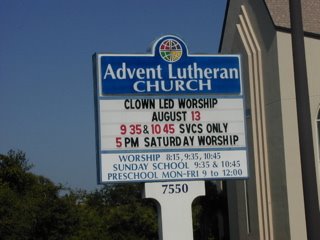Yet more thoughts on churches, denominations, and baptism.
We have a large, vibrant PCA church here in C-ville. OK, who’s kidding whom? There is no use not mentioning the name. It is
Trinity Presbyterian Church. The congregation actually started out meeting in the Baptist Student Center at UVA over 25 years ago. I am thankful for TPC’s ministry in C-ville. Without doubt, they have the biggest impact for Christ on the UVA Grounds of all local churches in C-ville.
We directly benefit from TPC’s presence in C-ville. Our interim choir director, Jo Pettitt, is a TPC member. We have several JPBC members who started out at TPC and after feeling lost in the crowd, drifted over to us. Someone once told me that TPC is like the "Ellis Island" for Christians in C-ville. You have to go through there at least once when you first arrive to get your name, then you can move on to the place where you are going to put down roots and live. No offense to any TPCers who might read this. Obviously many have put down roots there and are faithful members.
Here’s the thing. I have been told that many folk at TPC are really (former) Baptists. In fact, one friend, a former IMB missionary, at least regularly attends there (if he has not by now become a member). When I talked to him about this, he said he chose soteriology over ecclesiology. He likes their preaching and Biblical theology even if he did not like their church practice (infant baptism and lack of congregational church government).
Though I am glad for TPC, here is why I could not join there. I could not affirm membership in a church that practices infant baptism. I happen to receive TPC’s newsletter in the mail (for which I am grateful, as it helps me learn of Christian happenings in C-ville). Back on 3/19/06 the newsletter included a bulletin insert shared in TPC’s worship services titled "The Lord’s Supper and Children." It began by noting "People come from many different church experiences…." It continued to explain that some folk were concerned about the participation or lack of participation of children in the Lord’s Supper (also referred to in the document as "this sacrament" and "communion" and "Eucharist"—which raises other issues which make my Baptist hair stand on edge, but that’s another post!). It went on to explain that they did not expect children to partake in the Supper until "after they had made a public profession of faith in Jesus Christ as their Lord and Savior" (another sidenote: Does this mean some folk at TPC have wanted to do paedo-communion, a la R.C. Sproul, Jr.?). OK, now I am getting to the point where my conscience was really bothered. The insert read:
The infant children of Christians receive the "stamp" of God’s love in baptism, which makes them part of His redeemed community known as the church. As these children grow up being taught and discipled in the ways of the Lord, there comes a point at which they must embrace Jesus as their own Lord and Savior. When a young person takes this step of faith, he or she should make this personal faith known to the church community and prepare to make a public profession of that faith.
Here is the problem for a person with Baptist convictions at a Presbyterian church, even a very fine one like TPC. Presbyterians believe that baptism and church membership may precede the profession of faith in Jesus as Lord. This is why they baptize infants. I do not blame TPC for this; they are only being true to their Presbyterian confession. We Baptists, however, reverse that. We say the Bible teaches you must first profess faith in Jesus as Lord before you are baptized (we have another issue also with mode which we say the Bible teaches is immersion only, but that's another matter) and become a church member. The person who was infant baptized and then is baptized before membership in a Baptist church is not being re-baptized but, we believe, he is being baptized (rightly) for the first time.
For me, this is not a minor matter. Again, I am glad for TPC’s ministry and for that of many other faithful PCA churches. In fact, if I moved to a town with a typical Arminian SBC church and a faithful PCA church I would be torn as to where to unite. Thankfully, I think the person with Reformed and Baptist theology does not have to be torn in C-ville.
JTR

